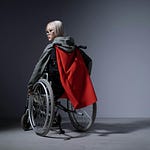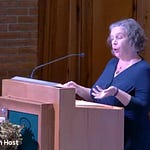There’s a moment in every magic show where the magician says something like,
“Now watch closely.”
And of course, we do. We watch the hand holding the deck of cards or the shining coin. We focus where we’re told, because we want to be amazed. But while our attention is fixed, the real trick is happening somewhere else – behind the table, up the magician’s sleeve, with the other hand.
That’s misdirection. It doesn’t lie to you directly; it just points your attention away from the truth.
Misdirection isn’t just a magician’s tool. It’s a strategy used by powerful institutions – corporations, governments, churches, and sometimes, by our own inner selves.
But we’ll come back to that.
First, I want to tell you a story. A true story about money, power, the cost of looking away, and… sugar.
In the 1950s and 60s, researchers were trying to understand the rapid rise in heart disease. Early studies began implicating increased sugar consumption as a key contributor. The sugar industry didn’t like that, so they used their influence – and their money – to change the narrative.
In 1967, a literature review was published in the New England Journal of Medicine that pointed the finger at saturated fat and cleared sugar of blame.(1) What wasn’t disclosed was that the sugar industry paid Harvard scientists to write that paper – and that they selectively chose which studies to include.
It worked. Saturated fat became the boogeyman. The food industry rolled out product after product labeled “low fat,” promising weight loss and health. But to make up for the loss of flavor, they increased the sugar content.
For decades, Americans were told to fear fat and embrace sugar. The consequences have been staggering. Type 2 diabetes has quadrupled since 1990. Rates of metabolic disease continue to climb. (2)
Millions of lives were shaped by the belief that fat was the enemy – while the truth was quietly tucked behind someone’s back.
“Pay no attention to the man behind the curtain,” said the Wizard of Oz.
But the part that haunts me isn’t the sugar companies. It’s the researchers. The ones who said yes to the funding. Who maybe told themselves, “It’s not a lie. It’s just emphasis. What’s the real harm?”
Did they feel a twist in their gut? Did something inside whisper, “This doesn’t align with what you believe”? And, if so,what did they tell themselves to make the discomfort go away?
We all probably know that feeling. The quiet knowing. The inner flinch. The rationalization that lets us look away.
“This isn’t the hill to die on.”
“Someone else will speak up.”
“Maybe it’s not that bad.”
“I’ve come so far; I can’t backtrack now.”
Sometimes, we think we’re being wise. But often, we’re afraid.
Afraid of losing a job.
Afraid of losing community.
Afraid of becoming someone others won’t recognize anymore.
So we shift our internal gaze. We tell ourselves a different story. We focus on making this someone else’s fault. We change the subject – internally, silently – so we don’t have to sit with the dissonance between what we say we believe and what we’re actually supporting.
Once you start to notice this pattern, you begin to see it everywhere.
I watched a recent interview with a prominent politician. He was asked – directly – about corruption within the current administration.
He didn’t answer.
Instead, he pivoted, bringing up long-standing accusations about his political opponents – accusations that, despite years of hearings, haven’t led to any charges.
He wasn’t offering evidence. He was offering misdirection.
What struck me wasn’t just the evasion. It was the question that lingered in me after:
Is this how he lives with himself?
By turning his attention to something that keeps him comfortable, so he doesn’t have to face what might feel unbearable to name.
And that’s when the echo gets louder.
I’ve done that. Not on that scale, but in my own way. I’ve looked away and self-justified. Haven’t you?
Misdirection isn’t always malicious. Sometimes it’s a survival strategy. But the longer we live in it, the more it shapes us.
When we practice misdirection, especially with ourselves, it doesn’t always look dramatic.
It looks like avoidance. Deflection. A carefully curated narrative we tell to keep from feeling that inner twist.
And over time, something in us drifts. Not because we’re bad, but because we’re afraid. Afraid that truth will ask too much of us. Afraid it will unravel something we’ve built.
But here’s what I’ve come to believe:
The soul doesn’t erode all at once. It erodes by degrees – each time we look away from what we know is real.
Even self-protection, if we live in it too long, eventually costs us something sacred: our clarity, our connection, our ability to trust ourselves.
And when enough people look away for long enough, the collective cost becomes unbearable.
Millions of lives shaped by a story that wasn’t true. Communities formed around image, not love. Churches, governments, even families held together by silence rather than healing.
But integrity – real, lived integrity – isn’t about being right all the time. It’s not about certainty. It’s about the willingness to look where we’ve been avoiding. To sit with what we don’t want to admit. To let discomfort teach us, instead of shaming us.
Integrity often starts in small, quiet moments:
A pause before responding. A breath before deflecting. A decision to turn inward, instead of pointing outward.
It might not change everything overnight, but it begins the realignment. Over time, that realignment becomes peace. Not comfort, necessarily, but peace. The kind that comes from being able to live inside your own skin again.
While we may never know the full reach of our integrity – or our misdirection – there’s something holy in remembering that our choices ripple far beyond what we can see. The sugar researchers couldn’t have known the scope of the damage they helped set in motion. They weren’t evil. They were human. They made a near-term choice that made sense to them in the moment.
But that moment helped shift a global health narrative. And the damage spread for decades.
That’s the thing about misdirection: it often looks small. The consequences almost never do.
And the same is true of integrity. It may look like a single choice, a private reckoning. But in a world shaped by what people don’t want to see, your willingness to see clearly is not just healing.
It’s revolutionary.
So if something’s tugging at you – something you've pushed aside or explained away—don’t rush past it.
Turn toward it.
Gently.
Curiously.
Bravely.
Because the truth is not here to punish you.
It’s here to call you back to yourself.
To call you back to Love.
Joni Miller, Ph.D., is a writer, researcher, spiritual coach, and speaker who uses her knowledge, education, and love of all things spiritual to help spiritual wanderers find a place they can call home, navigating by the light of Love. www.SpiritualGeography.net
(2)https://www.who.int/news-room/fact-sheets/detail/diabetes












